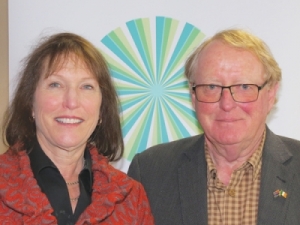South Island dairy production lifts despite stormy summer, feed risks loom
South Island dairy production is up on last year despite an unusually wet, dull and stormy summer, says DairyNZ lower South Island regional manager Jared Stockman.
 Massey University journalism lecturer Dr Cathy Strong with Rural News Group journalist Peter Burke.
Massey University journalism lecturer Dr Cathy Strong with Rural News Group journalist Peter Burke.
A group of journalism students from Massey University's Wellington campus gained an insight into the agribusiness sector last week.
The students visited the university's Palmerston North campus and a dairy farm near Levin.
Organised by Rural News Group reporter Peter Burke and Massey journalism lecturer Dr Cathy Strong, the day long tour included Massey's Number One Dairy Unit which has a special emphasis on environmental management and is on once-a-day milking. Here the students met Federated Farmers Dairy chair Andrew Hoggard.
They also visited Horticultural Research Centre Kebble Farm, hearing about new pastures and other aspects of sheep and beef farming. They also met Westpac agribusiness manager Dave Hutchison. They visited a dairy farm near Levin and held a press conference with the Minister for Primary Industries, Nathan Guy.
Burke says he helped organise this day and a similar one for teachers to help bridge the gap between rural and urban communities. This is the second year he has helped run the journalism day out; he has run three similar events for careers advisors at secondary schools in the North Island, with the same goal in mind.
"It is just one event and I acknowledge that other people are working hard to achieve a similar goal," he says. "I have been an agricultural journalist for much of my career and I believe it is important that journalists entering the media industry have a basic grasp of the size and scope of agribusiness, not to mention the abundance of great stories about the sector."
Burke's comments are echoed by Strong, who says the initiative by Rural News Group, DairyNZ, Beef + Lamb NZ, HortNZ, Federated Farmers, Westpac and Massey University will give journalists a fundamental understanding and hopefully a positive perspective of agriculture journalism.
"This is an opportunity to take our students out into the real world to [preview working] in the media. This day was a serious exercise for them and they all produced video news stories about what they observed. It was also a great opportunity for them to meet key people they are likely to deal with."
Strong says trips such as this one are a great way for people to learn; nothing beats getting out in the field and seeing and experiencing things. This trip was like last year's exercise, popular with students and resulting in excellent stories.
"Our journalism school being in mid Wellington means students are well versed in finding stories in Parliament and corporate offices, but opportunities to get out to the rural sector are fewer. Everyone involved in organising this event has helped towards better understanding by these future media content producers."
Rural News Group general manager Adam Fricker says the company is proud to support the journalists' and teachers' trips as events that help build understanding between town and country. The trips also help break down misconceptions about farming, notably that it is a career for dummies.
"The reality is that the agribusiness sector is probably the greatest user of technology in the country. Few people can imagine, for example, some of the technology in the typical dairy shed. Those of us in the industry tend to take this for granted, but city folk are often completely surprised at what they see," he says.
Fricker says Rural News Group is an example of an organisation that relies on good journalists and that is why they support this initiative.
The sale of Fonterra’s global consumer and related businesses is expected to be completed within two months.
Fonterra is boosting its butter production capacity to meet growing demand.
For the most part, dairy farmers in the Waikato, Bay of Plenty, Tairawhiti and the Manawatu appear to have not been too badly affected by recent storms across the upper North Island.
South Island dairy production is up on last year despite an unusually wet, dull and stormy summer, says DairyNZ lower South Island regional manager Jared Stockman.
Following a side-by-side rolling into a gully, Safer Farms has issued a new Safety Alert.
Coming in at a year-end total at 3088 units, a rise of around 10% over the 2806 total for 2024, the signs are that the New Zealand farm machinery industry is turning the corner after a difficult couple of years.